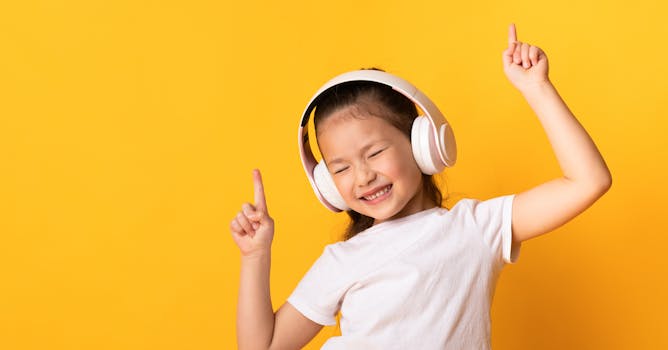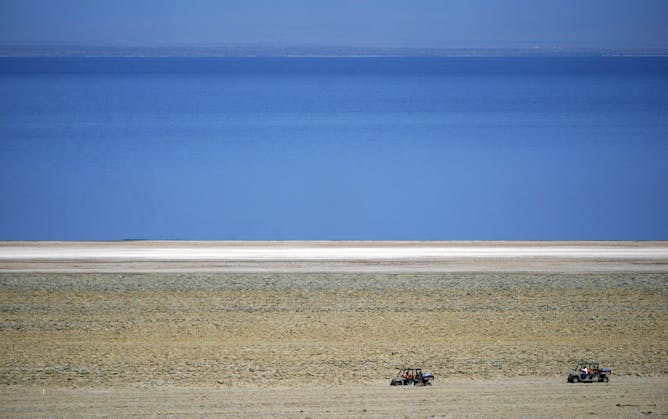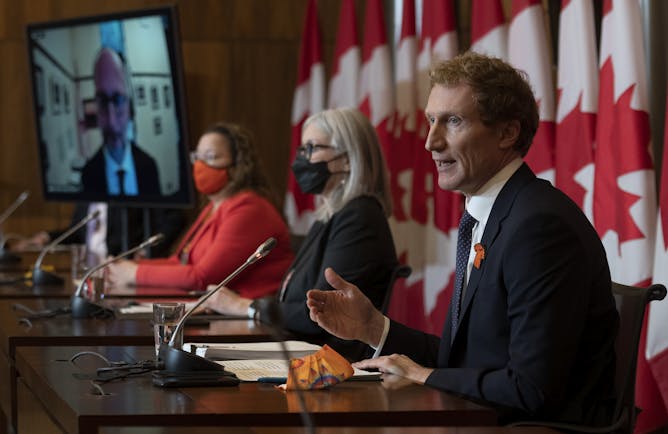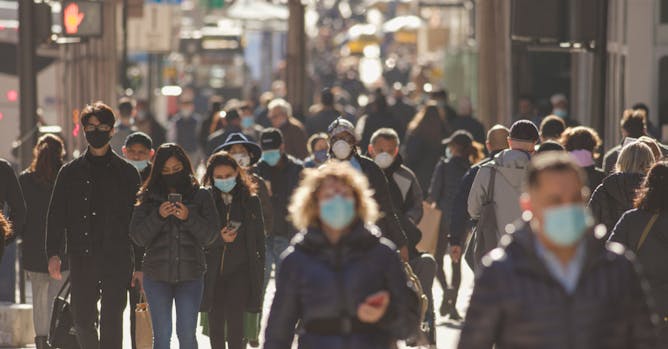|
|
|
|
If you’re a parent or caregiver in one of several provinces dealing with yet another pandemic school closure — how’s it going?
While experiences must vary wildly, depending not only on children’s ages and needs, as well as parents’ work and availability — not to mention the quality of internet access — a switch to virtual school requires significant adaptation for children, caregivers, teachers and families. In our third pandemic winter, stressors are high for many people, with some parents protesting school closures.
Today in The Conversation Canada, Ala Krivov from Western University examines the role music might have for families in the pandemic, especially during school closures when emotions can run high.
She suggests simple ways parents can integrate music into their days and the many benefits this could have. She writes: “Music can help revive the belief that everything will eventually be well, despite this seemingly never-ending series of lockdowns that many of us feel are damaging the spirits of adults and children alike.”
What are your thoughts and questions on schools’ long-term plans for schooling and teaching during the pandemic? We want to hear from parents, teachers and students about the challenges they face and their ideas. Please send your questions and story ideas to https://theconversation.com/ca/pitches/readers/new.
Also today:
Regards,
|

|
Susannah Schmidt
Education + Arts Editor
|
|

Disappointment, anger, sadness or passion can all be poured into a song.
(Shutterstock)
Ala Krivov, Western University
Family music sharing is a way to safely express emotions during school closures, for both children and parents.
|

Off-road vehicles are driven on a property that will be mined for lithium along the Salton Sea, in Niland, Calif., in July 2021. Lithium is critical to rechargeable batteries.
(AP Photo/Marcio Jose Sanchez)
W. Scott Dunbar, University of British Columbia; Davide Elmo, University of British Columbia; John Steen, University of British Columbia
Canada could become a global leader in the supply of materials needed for renewable energy systems if it finds ways to control the environmental footprints associated with their extraction.
|

Prime Minister Justin Trudeau gives a thumbs up signal after receiving his COVID-19 vaccine booster shot at a pharmacy in Ottawa on Jan. 4, 2022.
THE CANADIAN PRESS/Sean Kilpatrick
Gloria Novovic, University of Guelph
Canada’s strategy must include global engagement. Without it, we will be living on borrowed time, waiting for a new variant, a new booster, a new quick fix.
|

Cannabis use negatively affects performance on driving-related cognitive tasks.
(Shutterstock)
Dina Gaid, Memorial University of Newfoundland; Jennifer Donnan, Memorial University of Newfoundland; Lisa Bishop, Memorial University of Newfoundland; Maisam Najafizada, Memorial University of Newfoundland; Maria Josey, Memorial University of Newfoundland; Michael Blackwood, Memorial University of Newfoundland
Cannabis use doubles the risk of a fatal or serious-injury car crash, but some people believe it’s safer than alcohol-impaired driving. Here’s what you need to know about cannabis behind the wheel.
|

Developing mixed use and mixed income neighbourhoods will help cities recover after the pandemic.
(Shutterstock)
Kate Choi, Western University; Patrick Denice, Western University
Income, accessibility, the presence of green space and the availability of amenities are neighbourhood features that affect how COVID-19 has spread through cities.
|
La Conversation Canada
|

Anne Levesque, L’Université d’Ottawa/University of Ottawa
Le soutien public sera plus que jamais nécessaire pour s’assurer que l’esprit de l’accord est respecté et se traduit par des changements significatifs pour les enfants des Premières Nations.
|

Hélène Carabin, Université de Montréal; Caroline Kilsdonk, Université de Montréal
Il est crucial que les différents gouvernements, chercheurs et prestataires de soins de santé reconnaissent l’approche « Une seule santé » pour la prévention et la préparation à de futures pandémies.
|
Culture + Society
|
-
Deborah Carr, Boston University
When you prepare to talk about end-of-life decisions and the legacy you want to leave behind, try thinking about them as gifts you bestow to family and friends.
|
|
Education
|
-
Joseph J. Ferrare, University of Washington, Bothell; Kate Phillippo, Loyola University Chicago
Short-term disputes are really symptoms of deeper divisions in the U.S. over who deserves academic opportunity, and how to present the nation’s history.
|
|
Science + Tech
|
-
Don Arnold, USC Dornsife College of Letters, Arts and Sciences
Understanding where and how memories are formed could lead to more ways to treat conditions like PTSD and addiction.
|
|
| |
| |
| |
| |
|
|
|
|
|
|
|